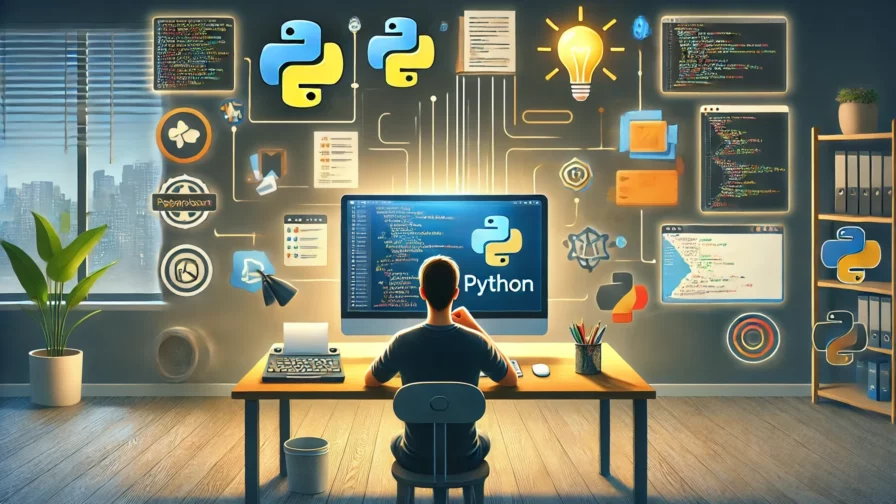
Learning and improving your Python skills is a never-ending journey. Whether you’re a beginner taking your first steps into the world of programming or a senior developer looking to sharpen your expertise, practicing Python is essential for growing as a programmer.
Luckily, in 2025, there are plenty of online platforms offering both basic exercises for beginners and advanced challenges for those who are already experienced. In this article, we’ll explore the top 10 platforms for practicing Python, analyzing the pros and cons of each one.
1. Replit
💪 Pros:
- Ease of use: An integrated development environment (IDE) that lets you write, run, and share code directly in the browser.
- Real-time collaboration: You can work on projects with other developers in real-time, making it great for teams or collaborative learning.
- Support for many languages: While it’s known for Python, it supports numerous other programming languages, making it versatile.
🔧 Technical details:
- Fully online IDE.
- Supports Python 3.x.
- Works with Python frameworks like Flask and Django.
❌ Cons:
- Performance may not be optimal for complex projects or those with large data sets.
- Some advanced features are limited in the free version.
Replit is perfect for those who want to practice Python quickly and without setup. It’s ideal for beginners looking to learn and professionals who need to test code snippets rapidly.
2. LeetCode
💪 Pros:
- Programming challenges: Offers a wide range of problems, from simple exercises to advanced challenges, with a strong focus on algorithms and data structures.
- Difficulty levels: You can start with easy problems and progress to very complex ones, making it perfect for all experience levels.
- Discussions and solutions: For each problem, you can see various solutions and discuss them with other developers.
🔧 Technical details:
- Supports Python 3.x.
- Solutions based on advanced algorithms and optimization.
- Strong integration with technical interviews (many problems are similar to those asked in tech company interviews).
❌ Cons:
- The problems are mainly focused on algorithms and data structures, so it may not be ideal for those who want to learn practical Python (like web app development or automation).
LeetCode is fantastic for improving your problem-solving skills and preparing for technical interviews. If you’re a senior developer, it will help you hone your abilities in complex algorithms.
3. HackerRank
💪 Pros:
- Wide range of exercises: Problems cover various areas, from simple to advanced, including algorithms, Python, AI, etc.
- Programming competitions: Participate in challenges to compete against other developers and improve your skills under pressure.
- Exercises with explanations: Each exercise is accompanied by an explanation and tips for improving solutions.
🔧 Technical details:
- Supports Python 3.x.
- Exercises focused on algorithms, data structures, and artificial intelligence.
- Platform that simulates real-world coding interview situations.
❌ Cons:
- The learning curve can be steep for absolute beginners, as many exercises are of medium-to-high difficulty.
- Some exercises are very theoretical and may not be practical for those looking to develop real-world applications.
HackerRank is perfect for developers who want to train with high-level technical problems. It’s also great for professionals looking to test their skills in preparation for a technical interview.
4. Exercism
💪 Pros:
- Practical and guided approach: Receive feedback from mentors to improve your code and learn best practices.
- Practical challenges: Exercises help you improve your syntax and solve real-world problems in Python.
- Developer community: Access to a community of experienced developers ready to provide advice.
🔧 Technical details:
- Supports Python 3.x.
- Exercises focused on pure practice: not just solving problems but improving code quality.
- Free mentorship for feedback on your exercises.
❌ Cons:
- May be less suitable for those who prefer a more structured and theoretical learning experience.
- Lacks a ranking system or competitions like other platforms.
Exercism is perfect for those seeking an interactive learning experience with strong practical support and personalized feedback. It’s useful for developers at all levels who want to improve their coding style.
5. Codecademy
💪 Pros:
- Structured course: Offers a complete path that teaches Python from the basics to more advanced concepts.
- Interactive: Each lesson is hands-on, allowing you to write and execute code directly in the browser.
- Real-time support: Provides immediate feedback as you write your code.
🔧 Technical details:
- Lessons on Python 3.x.
- Learn Python through practical exercises and real-world projects.
- Good documentation and support.
❌ Cons:
- Not entirely free: some advanced features require a subscription.
- More suitable for beginners who want a structured learning path rather than those looking for advanced challenges.
Perfect for beginners or those who need a structured guide to practice Python. The lessons are practical and accessible, but senior developers may find it a bit too easy.
6. PyBites
💪 Pros:
- Daily challenges: Receive a new challenge every day to improve your Python skills.
- Focused on pure Python: No distractions from other languages or technologies.
- Suitable for all levels: The challenges range from basic to advanced, making it perfect for senior developers.
🔧 Technical details:
- Daily challenges on pure Python to help you improve over time.
- Includes popular Python libraries like Pandas and Requests.
❌ Cons:
- Can become repetitive if you don’t actively keep up with each challenge.
- Doesn’t offer a structured curriculum, so it’s more suited to those already familiar with Python.
PyBites is an excellent platform for those who enjoy daily challenges and want to improve their Python skills step by step. It’s perfect for senior developers who want to sharpen their knowledge of the language.
7. Project Euler
💪 Pros:
- Mathematical problems: Great for developers who want to use Python to solve complex mathematical problems.
- Optimization: Each problem requires optimized solutions, which helps improve your skills in writing efficient code.
🔧 Technical details:
- Use Python to solve mathematical and algorithmic problems.
- Focuses on optimization and solving complex problems.
❌ Cons:
- Not suitable for those looking to practice Python for real-world applications or web development.
- Can be frustrating for those who are not familiar with mathematics or algorithm theory.
Project Euler is perfect for those who enjoy solving mathematical and algorithmic problems with Python. It’s ideal for developers who want to dive deeper into programming at a theoretical and mathematical level.
8. GitHub Pages
💪 Pros:
- Free hosting for static sites built with Python, using static site generators like Jekyll or Pelican.
- Integration with GitHub: you can version and manage your Python code directly through GitHub, making it easy to manage and update your project.
- Instant project visualization: perfect for showcasing portfolio or documentation projects created with Python.
🔧 Technical Details:
- Uses Git for versioning your Python code.
- Ideal for portfolios and open-source projects.
- Supports HTTPS and can be easily integrated with other development tools.
❌ Cons:
- Limited to static sites: GitHub Pages does not support backend or server-side logic, so it’s not suitable for dynamic Python applications.
- Best for showcasing projects, but not for interactive or complex applications.
GitHub Pages is the perfect solution for showcasing static Python projects like portfolios, blogs, or open-source projects. It’s not the right choice for dynamic backend applications, but it’s an excellent free and easy option for putting your work online!
9. SoloLearn
💪 Pros:
- Free and interactive course to learn Python.
- Active community to discuss and share solutions.
🔧 Technical Details:
- Lessons on Python 3.x with practical exercises and quizzes.
- Also offers a mobile app for learning on the go.
❌ Cons:
- Better suited for beginners; lacks advanced challenges for senior developers.
- Simple interface that might feel too basic for advanced users.
SoloLearn is perfect for beginners looking for a light and practical introduction to Python, and with its mobile app, it’s convenient for learning on the go.
10. Real Python
💪 Pros:
- Advanced tutorials and articles on Python.
- Focus on best practices and advanced concepts like testing and popular libraries.
🔧 Technical Details:
- Articles and courses focused on advanced libraries, real projects, and best practices.
- Content tailored for professional developers.
❌ Cons:
- Subscription required for full access to courses.
- Not suitable for absolute beginners.
Real Python is excellent for developers who are already familiar with Python and want to deepen their knowledge at an advanced level, learning how to use the best libraries and techniques for professional projects.
Conclusions
Whether you’re a beginner learning Python or a senior developer looking to perfect your skills, there are plenty of platforms to practice Python.
The options range from platforms like Codecademy and SoloLearn, perfect for those just starting out, to platforms like LeetCode and HackerRank, ideal for experienced devs wanting to enhance their abilities in algorithms and problem-solving. Each platform has its own focus, so you can choose the one that best fits your goals.

